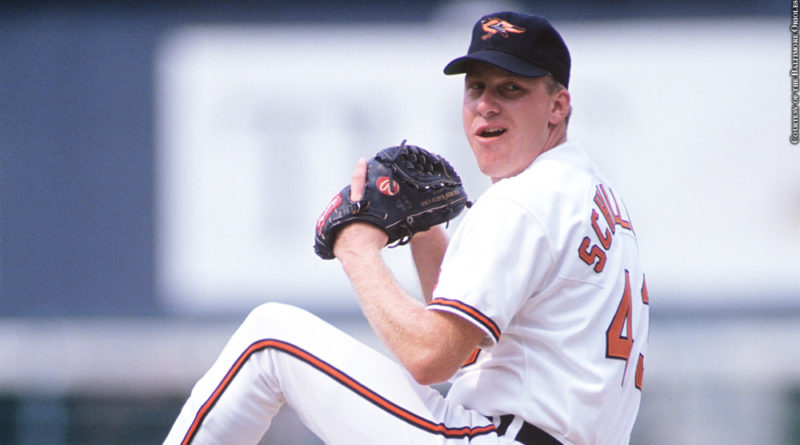David Ginsburg, who has covered Baltimore sports for the Associated Press for nearly three decades, shared on Glenn Clark Radio Jan. 2 that he voted for four players as part of his 2020 Baseball Hall of Fame ballot: Barry Bonds, Roger Clemens, Derek Jeter and Curt Schilling.
This marked the first time Ginsburg ever voted for Schilling, who is in his eighth year of eligibility on the Baseball Writers’ Association of America ballot. Schilling’s name was checked on 60.9 percent of ballots last year; 75 percent is needed for induction. Even if he doesn’t get the nod this year, Schilling is on pace to make gains toward eventual election, according to Ryan Thibodaux’s tracking of public ballots.
Schilling is one of the best starting pitchers not enshrined in the Hall of Fame; his career rates similarly with recent inductees Mike Mussina and Tom Glavine, according to JAWS. Schilling pitched in the big leagues from 1988-2007, compiling a 216-146 record, 3.46 ERA, 3,116 strikeouts and 4.38 strikeout-to-walk ratio.
Schilling broke into the big leagues with Baltimore, eventually carving out a bullpen role. After pitching 35 games in relief in 1990 (2.54 ERA), Schilling was traded to the Houston Astros along with outfielder Steve Finley and pitcher Pete Harnisch for first baseman Glenn Davis, a now-infamous exchange.
Schilling went on to become one of the best big-game pitchers ever, helping three teams — the Arizona Diamondbacks in 2001 and the Boston Red Sox in 2004 and 2007 — win World Series titles. Schilling went 11-2 in 19 postseason starts, striking out 120 and walking just 25 in 133.1 innings.
“I liked his numbers and I loved the way he played in the postseason,” Ginsburg said. “He’s the anti-Clayton Kershaw in October.”
However, Schilling has shared a variety of controversial political opinions since retiring. That includes an episode in November 2016, the same year he was fired by ESPN for offensive social media commentary, when he tweeted his approval of a photo of a man in a T-shirt that read, “Rope. Tree. Journalist. Some assembly required.” Schilling’s support in the next Hall election fell off, and he’s been inching toward the 75 percent threshold ever since.
“I don’t ignore that at all,” Ginsburg said of the controversies surrounding Schilling. “I thought that Schilling, while he was a player, was not as outspoken as he became … post-career. He started saying some things that I completely didn’t agree with that he shouldn’t have said and didn’t like it. I made my judgment from 1988-2007, that piece of work.
“His personality then was just gritty. I just thought he wanted to win. He wasn’t a jerk. I don’t ever recall him being that much of a jerk then. … That personality pretty much came out after he started getting behind a microphone, and people listened to him maybe more than they did when he was a player.”
Though Ginsburg added Schilling this year, former Montreal Expos and Colorado Rockies outfielder Larry Walker did not get Ginsburg’s check mark. This marks Walker’s 10th and final year of eligibility on the BBWAA ballot. Walker received 54.6 percent of votes in 2019, so he needs a huge final-year push to get in via the writers. He’s tracking at about 85 percent right now in the public balloting, and he figures to be a close call when the Hall of Fame class will be announced Jan. 21.
The five-time All-Star and the 1997 National League MVP is the highest-rated right fielder not in the Hall of Fame, according to JAWS. Walker was regarded as a five-tool player during his 17-year career; not only was he a career .313/.400/.565 hitter with 383 homers, but he also won seven Gold Gloves.
Walker is dinged for two reasons: durability — he exceeded 600 plate appearances just twice — and hitter-friendly Coors Field, his home for nine full seasons. He hit .381/.462/.710 throughout his career at Coors.
“There was a substantial difference between his performance in Colorado and on the road,” Ginsburg said. “Again, you vote for him, I will not argue that fact at all. For me, I thought that his numbers were inflated by the fact that he played much of his career in a place where it was a bandbox with mile-high air. I just think that really helped him put up some numbers that certainly he would not have put up in another stadium.”
Bonds, Clemens and Jeter rounded out Ginsburg’s ballot. Ginsburg called Jeter a “classic first-ballot Hall of Famer” and believes he’ll join former teammate Mariano Rivera as the only ones to ever receive unanimous support. Ginsburg initially didn’t vote for Bonds and Clemens, both of whom are in their eighth year of eligibility and are connected to performance-enhancing drugs. But in recent years, Ginsburg has acquiesced and voted for Bonds, the all-time home run leader, and Clemens, he of the third-most strikeouts ever.
That begs the question: If yes on Bonds and Clemens, why not other players who are connected to performance-enhancing drugs with Hall of Fame numbers like longtime slugger Manny Ramirez?
“If I’m going to put you on and I’m pretty sure you used steroids,” Ginsburg said, “they’ve got to be spectacular numbers.”
To hear more from Ginsburg and to find out the player he’s considering adding to his ballot next year, listen to the full interview here:
Photo Credit: Courtesy of the Baltimore Orioles

